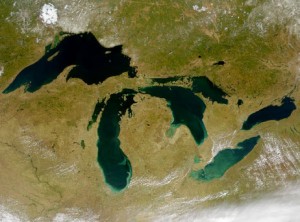Recently, I had the opportunity to speak with Professor John Gyakum from the department of Atmospheric and Oceanic Sciences about his new course “ATOC 183: Climate and Climate Change” being offered this winter. Full disclosure: I am the liaison librarian for his department and will be working with him to provide library support for the course.
Here is what he had to say.
Tara:
Thanks so much Professor Gyakum for taking the time to share with our blog readers about your new course “Climate and Climate Change”. First off, tell us about the course.
Professor Gyakum:
As you probably know, I’ve been teaching Natural Disasters (ATOC/EPSC 185) with John Stix for 25 years. And the thing is climate change is a natural disaster and I’m really passionate about talking to students and working together to understand what we know about climate change and perhaps more importantly what we don’t know.
Tara:
25 years, that’s a long time.
Professor Gyakum:
It is. I had no idea until John Stix mentioned it earlier this term, but yeah, it’s been that long.
Tara:
What is your anticipated student demographic for this course?
Professor Gyakum:
You know, I have not looked in detail at the registration numbers. We have about 145 students. My expectation is that the demographics of our student population will be very similar to what we’ve been having in Natural Disasters. The levels will range probably from U0 to U3. And we’re expecting to have students from all faculties.
Tara:
Are you expecting students to have a certain base level of knowledge when they’re starting this course or will it be for people new to this area of study?
Professor Gyakum:
There are no prerequisites whatsoever and I expect to be able to reach out to all students without any preparation for this course.
Tara:
What led you to developing the course?
Professor Gyakum:
We’ve been incorporating climate change into the Natural Disasters course for the past 5-7 years. It only lasts for one week as a module. It’s an exciting field. Furthermore, I’m in the Department of Atmospheric and Oceanic Sciences and it’s my view that we should be leaders in articulating the science [of climate change] to our students and doing so in an accessible way.
Tara:
Was this [initiative] driven from your own experience in Natural Disasters or was it a combination of hearing about needs for a course like this from students in that class or from elsewhere?
Professor Gyakum:
A combination of my experience in Natural Disasters and also as Department Chair. I’m not Department Chair now, but I had been for about 16 years. And Chairs assign teaching. It was pretty clear to me that this was a gap in our departmental outreach that we needed to fill.

Tara:
Absolutely. A lot of people report feelings of eco anxiety when faced with the immensity of the problem of climate change. How will your course help students deal with the kinds of feelings that this topic can generate?
Professor Gyakum:
Well, you know, we’ve touched on this a little bit in our [Natural Disasters] course. There’s no doubt about it that when we pose this question as a Slido [polling] question to the students, their reactions are predominantly pessimistic and lots of people are really quite depressed about this, with good reason. It’s very frustrating for students when they see that governments are not acting in a way that is responsible. What we tell them and what I’m going to be intending to articulate to our students is that there’s a lot of reason for optimism. Primarily because we, as individuals, can work towards a better future. In other words, we do not have to rely upon a government that may not be so proactive. We can do things for ourselves, that contribute to mitigating against climate change and taking actions.
Tara:
Things like?
Professor Gyakum:
On a personal level, of course, your own habits, including transportation. Take the bus, take the metro, walk. It’s not always possible for people to do that but, at the same time, people can and should be acting responsibly. Diet has a role as well. Our choices of what we eat have an impact on the climate.
Tara:
Definitely. How will your course fit in with existing courses? How will it complement things that are already being offered at McGill like “FSCI 198: Climate Crisis and Climate Actions,” offered through the Office of Science Education and “GEOG 514: Climate Change Vulnerability and Adaptation?”
Professor Gyakum:
First of all, I think our department should be playing a leadership role in this aspect. And I think the contributions that we’re going to be making with this climate course are, in fact, not duplicating what exists already but rather complementing. To do that, what I intend to do is focus on what we do know as scientists in Atmospheric and Oceanic Sciences. In particular, I will be discussing extreme weather systems and we will be having guest speakers from various areas in the Atmospheric and Oceanic Sciences community to articulate this. Water vapour is the most important greenhouse gas. And that’s not really looked upon very much in current climate change courses. One of the reasons is that water vapour has a tendency to disperse. You have a warm air mass, particularly in the summer. It goes away with a cold front and the water vapour lifetime is rather short. However, there’s been more recent evidence to suggest that extreme weather systems and even submarine volcanic eruptions can, in fact, inject a massive amount of water vapour into the stratosphere, where the lifetimes are much longer. Also, we’re going to be looking at some of the radiative aspects of clouds that have an impact on our climate. So there are some nuances here, very important subtleties that are critical to our understanding of the problem.
Tara:
So would it be fair to say that this course will be taking more of a science bent than some of the other courses that might be more [policy-oriented]?
Professor Gyakum:
I mean the other courses certainly have science in them. What we’re doing here is to emphasize extreme weather systems not just simply as a symptom but rather as a really significant producer of sometimes cataclysmic feedbacks on the climate system.
Tara:
I’m a fan of the Walrus Magazine and there was an article that came out in 2022 on climate change education. One of the people interviewed in that article was saying and I’m quoting “climate education should be framed in a way that incites hope and incites change.” That sounds like a very challenging, yet very important, task. How do you plan to incite hope and change in your classroom?
Professor Gyakum:
I think what we can do here is show our students tangible examples of what we as individuals can do and what we can do on a political level, albeit relatively small-scale to begin with, depending upon the students’ own personalities, to affect positive changes in our political system that would facilitate taking strong action against the ill effects of climate change. So I think this can be done really at all ages and at all levels and at all areas of expertise. I think that’s an excellent article that you were referring to. I have to produce a realistic state of affairs – there’s no question about that – but at the same time, there are good examples that I can show of individuals and also governments doing a terrific job in addressing the whole issue of climate change.
Tara:
You’re making me want to take the course! Are you accepting people auditing the course?
Professor Gyakum:
Totally. It’s not a remotely-given course, so some of this depends upon the size of the classroom, of course.
Tara:
Related to that, I know you have taught online before. I remember the years before the pandemic when you offered the very popular Natural Disasters course free online as a Massive Open Online Course (MOOC). What lessons about the way you taught that course will inform how you teach this new in-person one?
Professor Gyakum:
So when we taught the MOOC, both John Stix and I had this idea that teaching a 45 or 75 minute lecture was just fine, but what we found with the MOOC was that we really needed to break things up and focus on a topic for a limited period of time, 10 to 15 minutes. And then, at the same time, what we found since the MOOC, and since the pandemic, is that we’re really working harder towards engaging students more proactively, even in a 600-person class. We do this with questions, feedback and even discussions. I think that’s going to be a readily available tool that we can use in this climate course, which right now has about 140 students, which is a fraction of what we have in Natural Disasters. So I’m looking forward to that.
Tara:
So what you’re saying is that you’re taking the practice from your online course of integrating engaging activities and bringing that into the physical classroom?
Professor Gyakum:
Absolutely. We’re going to be using techniques to actively engage the students in every single class much more frequently than has been a typical practice. At the same time, we want to know if anything that we’ve said during the lecture has gotten into people’s brains. We can do that with some of the questions that we ask students. It’s very important. Sometimes we, as instructors, can be very surprised at what a student really learns and does not learn from what we’ve just said. [Using techniques for engaging students] is an excellent tool for gathering fairly quick feedback for both the students and the instructors.
Tara:
That can help you then to tailor your teaching moving forward.
Professor Gyakum:
Yes. Even in Natural Disasters – we’ve done this for 25 years – but we’re constantly changing the way we teach.
Tara:
That’s fantastic. I think that makes so much sense because every class is different and, as these things move forward and time passes, the kinds of knowledge that students are bringing to the classroom are different and that impacts what you teach.
Professor Gyakum:
That’s exactly right. And you know, one of your first questions about the demographics, I don’t know the specifics of the demographics, but I’m going to try in the very first class to engage with the students and work with them to address student strengths because the demographics of a particular class change from year to year. I want to know where they’re from, what sort of background they have. I can’t do it all in one day, but at least I can get an idea of what students’ interests are and what they would like to learn.
Tara:
Excellent. What are some of the main things that you hope students will take from your class this upcoming semester? What main takeaways are you hoping they’re going to come away from your class having learned?
Professor Gyakum:
I think the real emphasis is to instill students with a good idea of what we know about climate change and in particular what we don’t know. A lot of times, politicians, naysayers and so forth spend a lot of time talking about issues that are related to climate change, which are really unknown, totally unknown. There is a lot that we do know about climate change and in particular some of the initial phases of the course are going to go into basics. We will cover what the greenhouse gases are, what they do to our climate and how we as human beings can make changes. Following up on that, we’re going to be talking about some of the implications of the science and what we can do to learn and also to work towards a better environment, a more habitable environment for humans.
Tara:
Is there anything else that you want to tell me about the course?
Professor Gyakum:
Well, it’s going to be fun. I can’t wait for it to start. I realize there is a holiday coming on, but at the same time, I feel very enthusiastic and very passionate about this course. I hope to convey some of that enthusiasm and passion to the students so that they themselves will be able to move ahead and learn. And get something positive out of this course [that can help them] in the different paths they will take in the future. That might be policy, science, arts, anything that the students can do to convey their knowledge and do so in a constructive way to make our society better. So that’s my goal.
Tara:
That’s a very big mission.
Professor Gyakum:
It is. In academia, we have to think big, but at the same time, we have to be practical about what we can do. But just conveying the enthusiasm to some fantastic students that we have at McGill is sometimes all it really takes to expand this vision and to make ourselves a part of a much better world. So, to some extent, I’m relying upon the wisdom and the strength and the enthusiasm of our McGill students to go forward.
Tara:
You’ve got a good bank of people to do work with, that’s for sure. I think McGill students are definitely on board with this topic.
Professor Gyakum:
They certainly are and, like I said, I think I’ve told you before, I feel very privileged to be a part of the McGill community. To have you, in particular, as our librarian to help us and provide resources to students for doing their work. And the student body itself makes a huge contribution to our scholarly community. And I’m just very, very thankful that I can be a part of that.
Tara:
Me too. Thank you so much. I’m really looking forward to hearing more about the class as it moves forward. It’s been really exciting to hear about the course. Thanks again!







